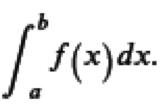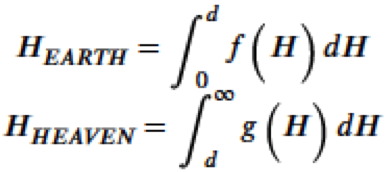
Tweet
October 8, 2014
Proceedings of the Natural Institute of Science | Volume 1 | HARD 4
If you believe in heaven, then you should be doing everything possible in order to get there
Department of Math & Theology (Matheology)1
1 - PNISsubmitted: September 7, 2012
accepted: September 12, 2012

Introduction
Assume that there is a heaven. Assume that it is everything you would want it to be. Maybe in your heaven, you could go anywhere in the universe you want, reconnect with lost loved ones, have a roundtable discussion with Aristotle, Newton, Einstein and Groucho Marx (for comic relief), or find out the answers to any number of mysteries (on our top ten list: an interview with Stanley Kubrick about the true meaning of The Shining).
Whatever is part of your concept of heaven, or whatever activities you see yourself enjoying there, there are usually two properties of heaven that are shared among most people: 1) in a heaven, you can only experience joy or happiness (i.e., only good things can happen to you; nothing bad), and 2) time spent in heaven is infinite. The rest of this paper will attempt to prove that if these two properties are true, and you truly believe in heaven, then you should be doing everything possible right now in order to get there.
The model
The first thing we need to do is to figure out how we’re going to quantify the quality of one’s life, with the assumption that any individual will seek to maximize this quantity (that is, to live the highest quality life possible). Now there’s many ways in which one could define a high-quality life (e.g., health, income, community, sense of purpose, etc), but one factor that underlies most of these definitions is happiness. In fact, several quality of life (QOL) indices try to incorporate happiness in some way or even try to directly measure happiness (e.g., Gross National Happiness and the World Happiness report). So, at least for the purposes of this paper, we will assume that quality of life is determined by one’s happiness, which we will abbreviate as H. We can also state that one’s purpose in life is to maximize H (that is, to have the highest level of H possible.)
Since we are assuming that there is in fact a heaven, we can split ‘life’ into two parts: 1) your earth-life (i.e., the life you are currently experiencing now on Earth) and 2) your heaven-life (i.e., your life after you die, or, maybe, ‘afterlife’). Let’s define HEARTH as the amount of happiness you experience during your earth-life, and HHEAVEN the amount of happiness you experience during your heaven-life. Thus, the total quantity of happiness you will experience in your total life (HLIFE) can be expressed as: HLIFE = HEARTH + HHEAVEN.
Now consider any person’s life along time (we define ‘time’ as a continuous variable and abbreviate it as t). At any point along time, a person experiences a certain amount of happiness, which can be either positive or negative (with the implication that negative happiness are moments of sadness, or something similar). If you could somehow add up all these quantities of happiness (positive and negative) for each of life’s time increments, then you would get a measure of the total amount of happiness you have experienced in your life (either your earth-life or your heaven-life). And that is how we could get estimates of HEARTH and HHEAVEN.
We can graphically represent pretty much everything in the above paragraph (see Figure 1). Here, time moves along the x-axis, and the y-axis represents the amount of happiness experienced at any particular time. HEARTH would equal all the happiness-values from time 0 (your birth) to time d (your death), while HHEAVEN equals everything from time d to infinity (remembering that a property of heaven is that it is infinite). Or, put another way, HEARTH would be the addition of the areas of all the shaded polygons from 0 to d, while HHEAVEN would be the area of the shaded polygon from d to infinity.

An attempt at some mathematics
Under the conditions of our model specified above, it can be mathematically proven that HHEAVEN>HEARTH or, in other words, the total amount of happiness you experience in your heaven-life will always be greater than the total amount of happiness you experience in your earth-life. To do this, we’ll need to involve calculus. Because most people’s feelings towards calculus are on par with doing taxes or going to the DMV, we’ll get into calculus just as much as is necessary, and then promptly get out.
One of calculus’ most important applications is calculating the area under any curve from one specified point to another (‘area under curve’ refers to the area encompassed by the x-axis and the shape of the curve. Curves that extend in the negative are subtracted from the grand total area). This calculation is written, quite beautifully, as:

The integral sign denotes that an integral is about to occur, much like how the plus sign (+) signifies impending addition. The letters a and b tell us that we’ll obtain the area under the curve from point a to point b. And, the f(x) is mathematical shorthand for whatever function is to be integrated (the ‘dx’ just denotes that x is the variable of integration and can be ignored here; it’s more meaningful when there are multiple variables). To apply this equation to HEARTH, the variable a would indicate your birth (or time 0), b would indicate your death (time d), and f(x) would indicate whatever function best describes your happiness trajectory, or your happiness curve, throughout your living life. And, we can do the same for HHEAVEN, except that a would be your death (time d), and b would be infinity (∞). Now, we can describe both HEARTH and HHEAVEN in terms that would make your high school calculus teacher very happy:

(the g(H) is there to allow for the fact that the function that describes HEARTH will most likely be different from the one that describes HHEAVEN).
So what makes HHEAVEN always greater than HEARTH? It’s those two important properties of heaven that we stated in the Introduction (along with one other small assumption, which we’ll get to in a bit): 1) you only experience positive happiness in heaven and 2) heaven is infinite. Because HEARTH is being integrated over two defined points (time 0 and time d), the area under its curves can always be calculated. Therefore, HEARTH can always be assigned some number. HHEAVEN is different, though. It is being integrated over only one defined point (time d), whereas we cannot assign a number to infinity (as mathematicians might say, infinity is without bound). The ∞ in the equation for HHEAVEN makes it an ‘improper integral’. The ∞ also means that, while in heaven, happiness will continue to positively accumulate forever and eventually overtake the total amount of happiness you may have obtained in your living life. Such is the power of infinity, and the property of heaven that it is a place of positive happiness. [side-note to those who remember high school calculus or those who have just looked up improper integrals on Wikipedia: yes, some improper integrals can be solved to obtain a real number, but only if they are convergent (i.e., a limit to the function exists). To say that g(H) is convergent is to say that happiness experienced in heaven slowly approaches 0 with each sequential time-step, which is not a heaven I would want to experience. This is that last small assumption stated above.]
What this means is that even if you experienced the maximum amount of happiness possible for every single time increment in your life on Earth, and even if the happiness you experience in heaven is much, much less than whatever you experienced in your earth-life, your HHEAVEN will still be greater than your HEARTH simply because heaven goes on forever. Given the properties of heaven stated above, HHEAVEN will always, always, always be greater than HEARTH. Thus, if you want to maximize the amount of happiness in your total life, HLIFE (and remember that: HLIFE = HEARTH + HHEAVEN), then you must have some HHEAVEN, and that is why you should be doing everything possible right now in your life on Earth in order to get to heaven. To put it even more simply, those who enter heaven are mathematically guaranteed to have happier lives than those that are denied entry, regardless of the happiness of their earth-life.
Some other implications
Your own happiness or joy should not be a primary objective in your life on Earth. Everything you do in your earth-life should be justified not by asking “Will this make me happy”, but rather “Will this get me into heaven?” In a way, your happiness becomes a secondary byproduct of the actions that you should be taking in order to gain access to heaven. Would donating all of your wealth to charities and devoting the rest of your life to preaching the Gospels increase your HEARTH? Maybe, maybe not. Would it increase your odds of reaching eternal paradise? The Bible says yes (see Matthew 19:21). Would buying a 1964 Chevrolet Corvette Sting Ray Coupe increase your HEARTH? God, yes. Would it ensure St. Peter waves you in those pearly gates? Not unless he was a gearhead, and cars didn’t exist in the early 1st century. If you do truly believe in heaven (and, based on recent polling, 68% of you do), then you would be a fool to make any decision in your living life based purely on your own happiness. It’s just simply too good of a deal to pass up: a lifetime of potential misery in exchange for an eternity of pure happiness.
For non-believers, the situation is a little bit simpler. Since you don’t believe in heaven, you’d probably not get there, which makes your HHEAVEN = 0 (or, if hell exists, HHEAVEN < 0). Either way, your only chance at happiness is in your earth-life, which means you should do everything possible to maximize HEARTH. If any of the wealthier true-believers take this paper to heart, then maybe you’d be able to get that Corvette Sting Ray you’ve always wanted at a discount price.

Proceedings of the Natural Institute of Science (PNIS) by https://instsci.org/ is licensed under a Creative Commons Attribution-ShareAlike 4.0 International License.